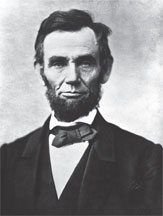Integrity lies beyond honesty
 Everyone knew that Abraham Lincoln was a capable lawyer, but he was
very choosy when it came to accepting cases. One day, Lincoln listened
to a client for some considerable time and then gazing abstractedly on
the ceiling, he swung around his chair and told him, “Well, you have a
pretty good case in technical law, but a pretty bad one in equity and
justice. You will have to get some other fellow to defend you. I cannot
possibly do it. While talking to the jury, I would be thinking,
‘Lincoln, you’re a liar,’ and I believe I should forget myself and say
it aloud.” Everyone knew that Abraham Lincoln was a capable lawyer, but he was
very choosy when it came to accepting cases. One day, Lincoln listened
to a client for some considerable time and then gazing abstractedly on
the ceiling, he swung around his chair and told him, “Well, you have a
pretty good case in technical law, but a pretty bad one in equity and
justice. You will have to get some other fellow to defend you. I cannot
possibly do it. While talking to the jury, I would be thinking,
‘Lincoln, you’re a liar,’ and I believe I should forget myself and say
it aloud.”
Although some of the lawyers practising at present may not endorse
Lincoln’s views for obvious reasons, his ideas confirmed that he was a
man of integrity. At a time psychology, philosophy and jurisprudence had
not developed, Lincoln along with several other men and women stood by
their principles without going along with the crowd.
The word “integrity” comes from the Latin adjective “integer” meaning
“whole or complete.” Integrity is the inner sense of “wholeness”
deriving from qualities such as honesty and consistency of character.
When Ethics was a subject for the Advanced Level examination a few
decades ago, students learnt that integrity was regarded as the honesty
and truthfulness or accuracy of one’s actions.
Sense of satisfaction
Integrity is not merely a concept of academic interest. As we grow
old, we often sit back and reflect on things we have accomplished. We
often wonder whether our lives were well spent or wasted. If a man can
feel a sense of satisfaction with the way he had lived his life, he will
enjoy integrity, a basic sense of wholeness or of being complete.
 |
|
Abraham Lincoln, a paragon of
integrity |
If a man is unable to feel a sense of satisfaction, he will be
overwhelmed by a sense of despair. During the retirement years, a man’s
prime concern should be to achieve ego integrity. Those who are unable
to do so can look back on their lives with a sense of satisfaction.
Those who are not fortunate to do so have the tendency to dwell on the
mistakes of the past and bemoan the paths not taken.
As a result, they will contemplate with bitterness the fast
approaching death. Facing death stoically in a spirit of acceptance is
far superior to wallowing in regret and resentment.
First duty
We can draw inspiration from men and women of integrity who are no
longer with us. Confusius, the celebrated Chinese philosopher, believed
that a person’s first duty was to be virtuous. While Abraham Lincoln
applied integrity to law, United States Congresswoman Barbara Jordan
remained a model of honesty in politics. Martin Luther King led the
Reformation Movement against the existing church with honesty and
unflinching courage.
Philosophers down the ages considered integrity in the context of
accountability. On many occasions integrity serves as a measure of
willingness to adjust a value system to maintain or improve its
consistency. Lincoln as a lawyer did just that before declining to
defend one of his prospective clients. Sometimes integrity, as a virtue,
gives rise to moral responsibility.
On the other hand, integrity involves personal honesty or acting
according to one’s beliefs and values. Philosopher Ayn Rand considered
that integrity does not consist of loyalty to one’s subjective whims,
but of loyalty to rational principles.
Value system
In common parlance, we use the word “integrity” to refer to a single
“absolute morality” rather than to the assumption of a value system. In
this sense, “integrity” conveys no meaning to those with differing
definitions of “absolute morality.” Then it becomes a vague assertion of
perceived political correctness or popularity. In other words, integrity
is synonymous with virtue in a moral sense.
Law Professor Stephen L. Carter says that integrity needs three
steps: “Discerning what is right and what is wrong. acting on what you
have discerned, even at personal cost; and saying openly that you are
acting on your understanding of right from wrong.” Prof. Carter regards
integrity as being distinct from honesty.
|



